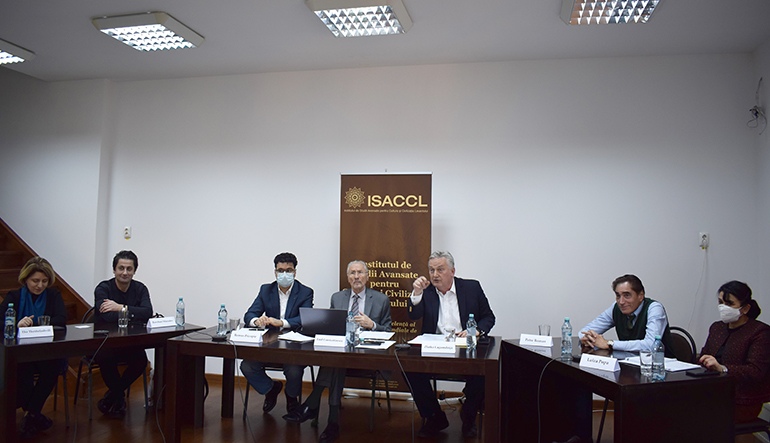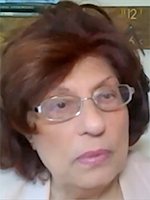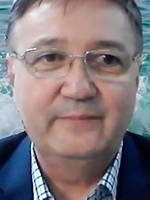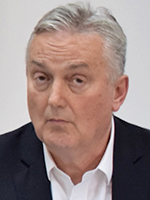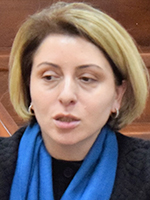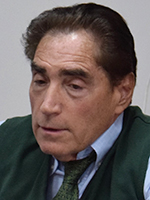On March 23rd 2022, the Institute for Advanced Studies in Levant Culture and Civilization, together with the Nizami Ganjavi International Centre, organized an emergency international conference on “Academic Solidarity in the Humanitarian and Moral Crisis Caused by the War in Ukraine”, in partnership with the World Academy of Arts and Sciences, the World University Consortium and the National School of Political and Administrative Studies in Bucharest. The Black Sea Universities Network also participated in the event.
Contributions to the event came on the part of Emil Constantinescu, President of the Scientific Council of the Institute for Advanced Studies in Levant Culture and Civilization and President of Romania 1996-2000; Petar Stoianov, President of Bulgaria 1997-2000; Zlatko Lagumdzija, President of the Council of Ministers of Bosnia and Herzegovina 2001-2002, Foreign Minister 2001-2002/2012-2015 and Professor of Information Management Systems and Information Technology at the University of Sarajevo; Ekaterina Tkeshelashvili, Deputy Prime Minister (2010-2012), Minister of Justice (2007-2008) and Secretary of the National Security Council of Georgia 2008-2010, Director of the European Anti-Corruption Initiative in Ukraine and Professor at the Kiev University of Civil Law and Politics; Petre Roman, Prime Minister of Romania 1989-1991, President of the Romanian Senate 1996-1999, Minister of Foreign Affairs 1999-2000; Garry Jacobs, CEO and Chair of the World Academy of Arts and Sciences, Editor-in-Chief of the ‘Cadmus’ Journal and President of the Mother's Service Society Institute in Pondicherry, India; Ismail Serageldin, Vice-President of the World Bank 1992-2000 and Co-President of the ‘Nizami Ganjavi’ International Centre; Rovshan Muradov, Secretary-General of the ‘Nizami Ganjavi’ International Centre; Remus Pricopie, Rector of the National University of Political Studies and Public Administration in Bucharest, Chair of the World University Consortium; Eden Mamut, Secretary General of the Black Sea Universities Network and Professor at the ‘Ovidius’ University of Constanta; Fadwa El Guindi, Professor of Anthropology at the University of California, member of the Board of Trustees of the World Academy of Arts and Sciences and member of the Scientific Council of the Institute for Advanced Studies in Levant Culture and Civilisation; Fotini Pomoni Papaioannou, Professor at the National and Kapodistrian University of Athens and Academician Nicolae Anastasiu.
The conference discussions focused on highlighting potential pathways for the national, regional and international academic community to actively engage in solidarity with the Ukrainian academic milieu, which has been severely affected by the armed conflict in Romania’s neighbouring country. Among the issues raised were the urgent imperative to assist the hundreds of thousands of civilian refugees, alongside their effects on the national institutions of Ukraine's neighbouring states - together with the concrete efforts undertaken by the countries facing the front-line consequences of this humanitarian crisis –, or the need to rally the academic and research community to the plight and dislocation of Ukrainian scientists, providing them with a safe haven from the conflagration and an environment in which they can continue their high-level research and development efforts in the specialist fields to which they have dedicated themselves. Participants also discussed the role of international organisations and policy fora in addressing a geopolitical crisis whose gravity has not been seen since the founding of the United Nations in 1945, as well as the applied relevance of long-theorised concepts such as “human security” to the possible future reconfiguration of global diplomatic institutions.
 Emil Constantinescu, President of the Scientific Council of the Institute for Advanced Studies in Levant Culture and Civilization
Emil Constantinescu, President of the Scientific Council of the Institute for Advanced Studies in Levant Culture and Civilization
"It is high time that professors and researchers worldwide join forces in an appeal to the international community to create a framework of action that will help reintegrate the displaced students, teachers and professors, currently in their countries of refuge, back into their chosen fields of activity"
"Our meeting today is a good opportunity to discuss the situation of the academic milieu of Ukraine and the efforts that we can make in order to ensure that despite the ongoing war, education and scientific research are preserved. I am glad to receive at the Institute my friend Professor Zlatko Lagumdzija of the University of Sarajevo, former President of the Council of Ministers of Bosnia and Herzegovina.
As the war progressed, I was touched to see brave stands taken by representatives of the educational and academic milieu of Ukraine. In early March, the Union of Rectors of Ukraine launched an appeal for all university rectors worldwide to exert pressure for the establishment of sanctions against Russia. Furthermore, they encouraged colleagues worldwide to donate for the support of the military effort, given the fact that some of the Ukrainian professors, researchers and academics joined the military. At the same time, in Russia, scientists of the Research Institutes of the Russian Academy – mathematicians, physicists and chemists addressed an open letter of protest against the military invasion of Ukraine by the Russian forces. The letter was signed was by approximately 6900 scientists. A few days after, the letter was removed from the science -oriented website which published it.
At the same time, I was both worried and shocked by the statement made by the Rectors Union of Russia, supporting the aggression perpetrated by Putin's regime in Ukraine. Up to a point, I was amenable to it. Authoritarian regimes tend to demand submission from all working professions, including academics. In the eyes of the public, academic support of any kind of political action serves as validation – all the more reason for authoritarian leaders to exert pressure on academia to support their actions. I, myself, faced such pressures during the Communist regime. And, up to a point, it is understandable why some choose to pay lip service to the regime. They fear for their lives and for the end of their academic career. Dissidence is not for academics. Take a politician out of the country and he will continue his work unhindered anywhere. Take a physicist out his laboratory, and his work cannot be continued.
It is high time that professors and researchers worldwide join forces in an appeal to the international community to create a framework of action that will help reintegrate the displaced students, teachers and professors, currently in their countries of refuge, back into their chosen fields of activity. And I bring to your attention the model that Romania has so far provided in this respect."
As you know, Romania has opened its borders and homes to the myriad refugees coming from Ukraine. What is less known is the fact that Romania also opened its schools and universities, to ensure that students and professors have an opportunity to continue the educational process in spite of the ongoing war. Since the beginning of the war in Ukraine, approximately five hundred forty thousand Ukrainians entered Romania seeking refuge from the war, according to statistics from the United Nations High Commission for Refugees. Many of these are women and children. While many still chose to see Romania only as a transit country, there are also those who remained, those who are attempting to access jobs and enrol their children in school or university.
Watch on YouTube
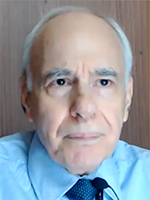 Garry Jacobs, CEO and Chair of the World Academy of Art and Science, President of the “Mother’s Service Society” research institute in Pondicherry, India
Garry Jacobs, CEO and Chair of the World Academy of Art and Science, President of the “Mother’s Service Society” research institute in Pondicherry, India
“We’re working on an initiative to look at not only root causes, but permanent solutions for this situation. I think we know that these problems didn’t just start this year. They go way back, to the end of the Cold War; and the root causes are that we have yet to build a global system of cooperative security to replace this old paradigm of competitive security.”
“Institutions all over the world have a responsibility not just to condemn the violence and the suffering today, but to really try to move forward to new conceptions. And I believe the initiative that the organisers have taken on this today, shows that, really, the responsibility is much wider. I really applaud the graciousness and generosity of the Romanian people and Romanian institutions that have been opening your hearts and homes and schools to embrace the refugees. But I think there’s much more that can be done, not only by the institutions who are on the borderline between Eastern and Western Europe, but institutions all over the world can be opening up in educational opportunities, even teaching opportunities, research opportunities… Even if they’re going to be conducted online from a distance, we know that can be done. And so, I applaud this and encourage us to think about how the model that you’re demonstrating here can be extended much more widely to educational institutions, to national academies and global academies, and research institutes all over the world. There’s something all of us can do, and we need not stop there. I hope that this conference can lead to a call – not only to those in the region, but to those globally, to global civil society, to ask ourselves what we can do, and how we can contribute to addressing this crisis.”
Watch on YouTube
Fadwa El Guindi, member of the Board of Trustees of the World Academy of Art and Science and of the Scientific Council of the Institute for Advanced Studies in Levant Culture and Civilization
“I propose that the appeal that is being made here be reformulated to extend beyond Europe, expanding to the international academic world, particularly to the Arab world and Africa, encouraging them to open their educational institutions to welcome Ukrainians whose education was interrupted. And, as an extension of this modification, would be an appeal to these same regions to also initiate collaboration by their scientific institutions carrying out research with Ukrainian counterparts.”
“No doubt, this idea will pose a challenge, and will require seeking links to networks and ways of reaching out; but it is worth it. It would widen the collaborative academic environment beyond the national and the regional to a broader world. This would not only provide a wider array of choices for the Ukrainians, but would also take us out of a Euro-centric zone of cooperation into a worldwide cooperation.
In the current environment, where a war in one region is affecting the security and stability around the wider world, and beyond the region of the war, such an attempt would most likely serve to build bridges of tolerance and teach cross-cultural inclusivity, and provide different forms of knowledge. The impact might be what the world needs at this time: an environment in which it might become appealing to build alternatives for settling conflicts other than the military path. Education and cross-cultural knowledge might generate empathy, which can become the means toward that non-military path.”
Watch on YouTube
Eden Mamut, Secretary-General of the Black Sea Universities Network
“We, as the BSUN, consider that the process of re-launching the dialogue and the possibilities to address the cooperation in our region is fundamental. For this, this autumn, in October, in Bucharest, at the University of Bucharest, we have planned a regional conference to bring together the experts, academicians and researchers in this field.”
“In this context, we fully support the initiative of the Institute for Advanced Studies in Levant Culture and Civilization to organise the platform for cooperation of academics in the region, and we hope that one of the milestones of the activity undertaken through this platform might be in October, when we are planning to organize this conference. I would like to thank you once again for this opportunity, and to thank all of you for what you are doing, for the positions that you are taking, and for your presence in this kind of debates – because we consider that this is the only way towards a sustainable peace in our region.”
Watch on YouTube
Ismail Serageldin, Vice-President of the World Bank 1992-2000, Co-President of the “Nizami Ganjavi” International Centre
“I think there’s an enormous amount of work to do, from organizing the enormous amount of documentation from hand-held telephone videos to CCN, BBC, TV5, or whatever footage from other situations, which would be able to document the situation more accurately, for another day, when we will be able to hold accountable those responsible for what we are seeing.”
“As academics, we should be participating in the documentation on the war to the extent we can, with our colleagues from Ukraine. This should not go without accountability; and I think there’s an enormous amount of work to do, from organizing the enormous amount of documentation, to hand-held telephone videos, to CCN, BBC, TV5, or whatever other footage from other situations, which would be able to document the situation more accurately, for another day, when we will be able to hold accountable those responsible for what we are seeing. I think we are all witnessing the horrors of attacks on civilians – from residences, to schools, to hospitals, to children’s hospitals – it’s almost unbelievable, but we are facing a true reality: we’ve seen this happen in Syria before, with cluster bombs dropped on civilian neighbourhoods. We should not allow the false narratives or alternative facts that are being produced by the guilty parties to muddy the waters. That, in a sense, is what we academics are very good at – this is our job. When you’re writing a scientific paper, you try to analyse the data as forcefully and as effectively as you can. If you are writing history, you disentangle the realities from the myths. I think that is something that we can do, perhaps better than any other community. Doctors have their own immediate tasks, educators have classrooms to deal with – but, as academic researchers, I think that we should be already organising ourselves to collect information in order to one day be able to bring it back to where it would do the most good.”
Watch on YouTube
Zlatka Lagumdzija, President of the Council of Ministers of Bosnia and Herzegovina 2001-2002, Professor of Information Management Systems and Information Technology at the University of Sarajevo
“We are scientists, we are educators and we are really looking after hard, core facts. I really hope that we will continue to be the moral voice of the educational community together with your Institute, with the ‘Nizami Ganjavi’ International Centre. This is only one simple thing, one small segment of what we do, but it is very, very important.”
“The European Union is six times less burdened by refugees than the average Romanian city. In Moldova, it’s even worse. The numbers are terrifying, simply terrifying. So, I think it is very important that our appeal be very direct, very precise in asking the European Union to support education and the refugees who are so strongly affected by this brutal Russian aggression. We have to add a global appeal to those countries who are supposed to be on the same side in the fight for democracy, because they have the economic capacity to do it. We are scientists, we are educators and we are really looking after hard, core facts. I really hope that we will continue to be the moral voice of the educational community, together with your institute, with the ‘Nizami Ganjavi’ International Centre. This is only one simple thing, one small segment of what we do, but it is very, very important.”
Watch on YouTube
Ekaterine Tkeshelashvili, Deputy Prime Minister of Georgia 2010-2012, Professor at the Kiev University of Civil Law and Politics
“The help and assistance that could now be provided to academics and to our colleagues in Ukraine would be their involvement in research projects, in real activities in various research institutes, universities and think-tanks.”
“I am a practitioner of International Public Law; so, believe me, I don't easily use words that I'm about to use here. But these are not only war crimes and crimes against humanity. What we already see in Mariupol – but also in so many other localities in Ukraine – are deliberate attacks on food stocks, on civilians, on shelters themselves being bombed, which already reach the qualification of systemic genocide. We are seeing a tragedy of unparalleled nature for the 21st century, in parallel to the human disasters and suffering that humankind experienced in the 20th century.
There are some universities in Ukraine that are trying to do the work that they are meant to do and the best they can in terms of survival: be that the physical survival of their staff, or in terms of their capacity to sustain their families. For example, the Kiev School of Economics is now engaged in a very active analysis of the reconstruction of Ukraine, of the development of new methodologies for the assessment of the economic damage that is inflicted on the country.”
Watch on YouTube
Rovshan Muradov, Secretary-General of the “Nizami Ganjavi” International Centre
“In this 21st century when we have to think of how to develop our world and how to resolve the issue of climate change, we are instead suffering from a humanitarian crisis, a horror that is now happening in Ukraine.”
“Today, what is happening in Ukraine is a shame for our humanity, for the 21st century. In this century, when we have to think of how to develop our world and how to resolve the issue of climate change, we are instead suffering from a humanitarian crisis, a horror that is now happening in Ukraine. The “Nizami Ganjavi” International Centre is taking a strong stand on the crisis in Ukraine through statements, appeals and different initiatives that can be called upon.
Already, four million refugees have fled Ukraine. There are countries like Romania and Moldova who are receiving them, and the majority are women, they are teachers, they are university professors, and they must be helped integrate into our societies.”
Watch on YouTube
Petre Roman, Prime Minister of Romania 1989-1991, President of the Romanian Senate 1996-1999, Minister of Foreign Affairs 1999-2000, Member of the Club of Rome
“We should lodge an appeal to the Russian Academy of Sciences, a largely autonomous body from the point of view of political power. They are a body of academicians, of scientists, of professors like us; and an appeal to them, in which we call on them to voice their opinions to stop the destruction of schools, of universities, of research centres and of cultural heritage, could play an important role.”
“We, the European Union and the Western world, are very quick to condemn this invasion of the Russian Federation into Ukraine, we were very good at starting actions with the intention to somehow stop the invasion, which unfortunately was not possible. We see many political leaders across the world, not a few, but many, who refrain from condemning the invasion. We see some analysts in the West, not a few, but many, who are warning that the sanctions against Russia could even turn against us, against the Western world; analysis who are saying that we might better stay neutral. My conclusion, as I had foreseen from the first, is that we really need much more from the Russian people themselves. I think we should lodge an appeal to the Russian Academy of Sciences, a largely autonomous body from the point of view of political power. They are a body of academicians, of scientists, of professors like us; and an appeal to them, in which we call on them to voice their opinions to stop the destruction of schools, of universities, of research centres and of cultural heritage, could play an important role. Until now, I haven't seen anybody appealing to the Russian Academy of Sciences, but I know that they are largely autonomous and their worth is important from the point of view of the ordinary Russian people.”
Watch on YouTube
Petar Stoyanov, President of Bulgaria 1997-2002
“I very much admire the idea of this conference being devoted to how to help the academic environment in this very large, very serious moral and humanitarian crisis caused by the war in Ukraine. I fully support this idea, as well as that of preparing an appeal to the Russian Academy of Science. I think it would be a very important signal to the Russian academics, to the Russian university professors.”
“I don’t belong to the academic community, but I am very happy to join this conference because I firmly believe that, at this moment, every act of solidarity with the Ukrainian people is extremely important. So, we know what the situation in Ukraine is terrible; but today we have to be fully united and fully mobilised, so that we can achieve two main goals: first of all, to stop this terrible war as soon as possible; and, secondly, to help the Ukrainian people to overcome the devastating consequences of this terrible war.
The consequences will be not only material, but also psychological, social, and will affect all aspects of political, economic, cultural and academic life. Because of that, I very much admire the idea of this conference being devoted to how to help the academic environment in this very large, very serious moral and humanitarian crisis caused by the war in Ukraine. I fully support this idea, as well as that of preparing an appeal to the Russian Academy of Science. I think it would be a very important signal to the Russian academics, to the Russian university professors. The Russian people, the people who now live in Russia, should also be encouraged – because there are a many of them who don’t support this war; on the contrary, they have the courage to stand against the war. Therefore, we should encourage these people to join us.”
Watch on YouTube
Fotini Pomoni Papaioannou, Professor at the National and Kapodistrian University of Athens, Member of the Advisory Board of the Institute for Advanced Studies in Levant Culture and Civilization
“Following the invasion of Ukraine by the Russian Federation, I am standing in solidarity with the Ukrainian students and professors seeking refuge all over Europe, as well as with the entire population of the country, particularly the children of this war.”
“Ukraine’s predicament is not unfamiliar to us as a nation. Many times have we Greeks been faced with an enemy that far outnumbers us and far outmatches us through the ages. I will read you two quotes from Aeschylus, from his work, The Persians:
“Arrogance in full bloom bears a cloak of ruinous folly, from which it reaps a harvest all of tears.”
If I am allowed to read it in Greek:
“Hybris gar exanthous' ekarposen stachun ates, othen pagklauton exama theros.”
Nonetheless, we have prevailed against seemingly insurmountable odds, not once but many times; and we do not doubt that, similarly, Ukraine will prevail as well.
The second quote:
“Send not your armies against the Greeks [now, Ukrainians] though the host of Medes outnumbers them, for the very earth is their ally”.
"Ei me strateuoisth'es ton Ellenon topon, med'ei strateuma pleion to Medikon. Aute gar e ge summachos keinois pelei."
From Aeschylus, The Persians.
All of Greece feels great compassion for the people of Ukraine, and we stand in solidarity with them.
Both quotes are the ghost of Darius, the dead father of Xerxes, speaking to the chorus and to Atossa, Xerxes’ mother from Hades, the Land of the Dead. He is admonishing them for the arrogance and injustice of his son, Xerxes, and the misbehaviour of the Persian troops.”
Academician Nicolae Anastasiu
“After the serious crisis in Ukraine, there must be a move towards peace, towards a lasting peace that will build stable bridges of communication between all the peoples of Europe. It is scientists and scholars who are always discovering new means of dialogue, regardless of the political values their governments share.”
“90 years ago, Nicolae Titulescu, the former Foreign Minister of Romania and former President of the General Assembly of the League of Nations (1930-1932), said that: “when peace is endangered, it is answered not by war, but through the organisation of peace”.
The Romanian Academy, comprised of scientists and creators of authentic spiritual values, stands against violence; and strongly condemns, in a press release issued by the Presidium of the Romanian Academy, the war unleashed by the Russian Federation against Ukraine.
After the serious crisis in Ukraine, there must be a move towards peace, towards a lasting peace that will build stable bridges of communication between all the peoples of Europe. It is scientists and scholars who are always discovering new means of dialogue, regardless of the political values their governments share.
Perhaps more than ever, what is needed now is an alliance of harmony-loving spirits capable of demanding a swift end to the war and of supporting the organisation of peace.”
Remus Pricopie, Chair of the World University Consortium, Rector of the National School of Political Studies and Public Administration
“Three weeks ago, our university received refugees for the first time. You know, it’s true that I’ve been trained to be a professor; but I was not prepared to serve refugees. I learned, three weeks ago, together with our colleagues from other universities, with Romanian officials, and we put our facilities at the disposal of the authorities to try and help these people.”
“Let’s look back to the last two years of COVID. Did Romanian universities, or universities around the world, only carry out teaching and research? We all know universities were in the frontline of trying to find the solution of today: the vaccine. Also, not only medical universities but also schools of social sciences were trying to find a solution to how to better manage societies during a crisis. Somehow, all universities – never mind professors or students – tried to contribute to this very dramatic pandemic situation that the whole world experienced over the past two years. And, when we were on the verge of seeing the spring, we were thrust against the Ukraine situation. Again, universities are carrying out research and teaching; but universities and university voices were also among the first to say: “this is wrong”. A couple of weeks ago – we have here an expert on international law who underlined in our conference today that what we have in Ukraine are war crimes – a couple of weeks ago, academics were saying exactly the same. Specialists in national law, in international politics. Putin is not happy with this new label that he managed to win himself; but that’s the situation. Universities were among the ones trying to present solutions to the politicians, with which to fight against Putin and against Russia, from economic sanctions to various other measures.
And universities are not doing just conceptual things. Three weeks ago, our university received refugees for the first time. You know, it’s true that I’ve been trained to be a professor; but I was not prepared to serve refugees. I learned, three weeks ago, together with our colleagues from other universities, with Romanian officials, and we put our facilities at the disposal of the authorities to try and help these people. We have had different kinds of situations, like that of a seven-day-old boy born in a metro station in Ukraine. What to do with this boy, with the mother and the father? The first thing that we considered we had to do was to call a medical doctor, to see if they are ok – not just the child, but also the mother and the family. Also, among the first refugees, there were many students from India. On this occasion, I learned that there were over 20.000 Indian students in Ukraine. OK, what to do with them? Working with the Ukrainian Embassy in Bucharest, with the Romanian Ministry of Foreign Affairs, we tried to help them somehow get back home.
In conclusion, maybe someone will say “look, some academics met again, some in Bucharest, some online, and they fight for Ukraine”. Yes. Because, from this academic debate, we learn from each other; after this, we will go back to our offices and we will – just maybe – better know how to fight for Ukraine, and, finally, how to fight for us.”
Watch on YouTube


